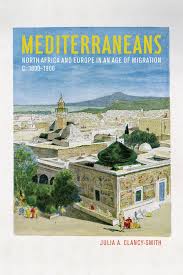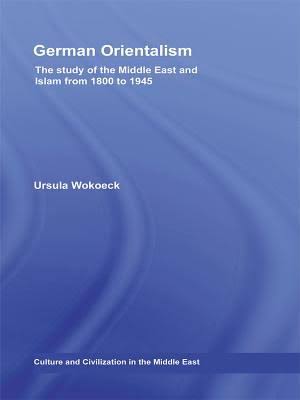-
Add to cartQuick view
Elizabeth F. Thompson. Justice Interrupted: The Struggle for Constitutional Government in the Middle East. Cambridge, MA: Harvard University Press, 2013. 432 pp.
Elizabeth F. Thompson. Justice Interrupted: The Struggle for Constitutional Government in the Middle East. Cambridge, MA: Harvard University Press, 2013. 432 pp.
$5.00Free!Add to cartQuick view -
Add to cartQuick view
Erotics of the Exotic: Orientalism and Fictionalization of the Mooress in the Early Modern Mediterranean
Free!The representation of women in the realm of Islam in early modern Spanish literary, religious, historical, and political texts provides a very significant key to the perception of the “Other” in Spain. These women were categorized according to their radically different circumstances: in Spain they were Moriscas (where they were the objects of an internal colonization), but in the Ottoman Empire (which was seen as a threat to Christian Europe) they were Moras and Turcas. Muslim women were systematically portrayed as highly sexualized subjects, sometimes in combination with the mystified harem and the slave market. In a tone ranging from contempt and disgust to ravishing desire, Muslim women were depicted as sensual and sexually accessible creatures. This Occidental fantasy was a means of establishing an imaginary domain over a powerful rival. Such representations of women were themselves essentially Orientalist, even when they occurred prior to the colonial and postcolonial relationship between the West and the Orient, suggesting that Orientalism itself ought not to be exclusively linked with colonialism and postcolonialism.
Add to cartQuick view -
Add to cartQuick view
Exile, History and the Nationalization of Jewish Memory: Some reflections on the Zionist notion of History and Return
The essay tries to analyze the notions of “history” and “return” in Zionist discourse in order to clarify their political and cultural implications. I investigate the meaning and function of the phrase “return to history”, commonly used for the description of Zionism, in two different sets of terminologies: the theological terms that defined Jewish-Christian polemics and the terms “culture,” “civility,” and “ethnicity” as used in the discourse of modern nationalism and colonialism. Accordingly I argue that the consciousness embodied in the phrase “return to history” meant the acceptance of the very terms and principles that generated the exclusion of the Jews in Europe. Thheologically and in the terms of premodern Christian-Jewish polemics, the phrase expresses an acceptance of the Christian perception of history of the Jews and their exile. On another level, the use of the modern national model of history for the representation of the Jewish past reveals the obvious Orientalist dimension of the secularization of the concept of history, as referring exclusively to the Christian West. In Zionist discourse both the theological-redemptive and the Orientalist aspects were integrated in a way that illuminated them both. Finally, the return to history and the return to the land meant the obliteration of the history of the land and the existence of its inhabitants. It also determined the removal of the Jews from the multiple local histories in which they had existed in exile in order to include them in one common, separate narrative. As a conclusion, I suggest to re-consider the options embodied in the concept of exile for an alternative way of thinking Jewish-Israeli existence and collectivity.
$5.00Free!Add to cartQuick view -
Add to cartQuick view
Julia Clancy-Smith, Mediterraneans: North Africa and Europe in an Age of Migration, c. 1800-1900, Berkeley: University of California Press, 2011. 445 pp.
Julia Clancy-Smith, Mediterraneans: North Africa and Europe in an Age of Migration, c. 1800-1900. Berkeley: University of California Press, 2011. 445 pp.
$5.00Free!Add to cartQuick view -
Add to cartQuick view
Just Like Democracy: Ethnography of Realpolitik in a City of Immigrants
Free!The goal of this paper is to open a new space for understanding political culture “after orientalism,” in polycultural, liberal societies. Relying on three years of ethnographic research (2001–04) at the Likud party chapter in the immigrant city of Ashdod, I present an ethnography of citizenship in action. I argue that at the point where citizenship as an ideal type meets immigrants from developing countries, people mimic and utilize citizenship as a way to support their social mobility. Ideology becomes ID-ology and stands in the center of a new political culture that is neither Occidental nor Oriental.
This new culture of citizenship is formed in three stages: first, the immigrants adopt and approve the Occidental perception of citizenship that fits the Occidental imagination of citizenship; second, the Likud party members distinguish between form and content, loading the “appropriate” definition of citizenship with new content and new ways of interpretation that promote their purpose of socially mobilizing themselves and taking over positions of power; and third, new political cultures of citizenship occupy the city hall. The new citizenship resembles Occidental citizenship, but uses a different toolbox for power accumulation and new methods of interpretation.Add to cartQuick view -
Add to cartQuick view
Ursula Wokoeck. German Orientalism: The Study of the Middle East and Islam from 1800-1945. New York: Routledge, 2009. 333 pp.
Ursula Wokoeck. German Orientalism: The Study of the Middle East and Islam from 1800-1945. New York: Routledge, 2009. 333 pp.
$5.00Free!Add to cartQuick view
- Home
- About JLS
- Issues
- Vol. 9 No. 1 | Summer 2019
- Vol 8 No 2 Winter 2018
- Vol. 8, No. 1: Summer 2018
- Vol. 7, No. 2: Winter 2017
- Vol. 7, 1: Summer 2017
- Vol. 6, Summer/Winter 2016
- Vol. 5, No. 2 Winter 2015
- Vol. 5, No. 1 Summer 2015
- Vol. 4, No. 2 Winter 2014
- Vol. 4, No. 1 Summer 2014
- Vol. 3, No. 2 Winter 2013
- Vol. 3, No. 1 Summer 2013
- Vol. 2, No. 2 Winter 2012
- Vol. 2, No. 1 Summer 2012
- Vol. 1, No. 2 Winter 2011
- Vol. 1, No. 1 Summer 2011
- Blog
- dock-uments
- Subscribe
- Submit
- Contact



